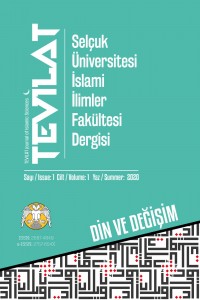Abstract
İslam yedisinde ne ise yetmişinde de o olacak şekilde asla değişmeyen bir öze ve o özü ayakta tutacak bir takım şerî itikadî, amelî ve ahlâkî kurumlara ve onlarla ilgili ahkâma sahiptir. Ancak hayatiyetinin sürdürülebilmesi için de vücuttaki hücrelerin sürekli yenilenmesi gibi yenilenmeye (tecdid) ihtiyacı vardır. Bu iki özellik bir arada tutulamadığı zaman İslam hukuku ya tamamen başkalaşır ve artık ona İslam hukuku denemez ya da donuklaşır ve hayata koşut varlığını sürdüremez, hayatın dışına itilir ve işlevsiz kalır.
Thanks
Selam ve muhabbetler.
References
- Akgündüz, Ahmet. Osmanlı Kanunnâmeleri ve Hukukî Tahlilleri 3. Kitap Yavuz Sultan Selim Devri Kanunnâmeleri. İstanbul: FEY Vakfı Yayınları, 1991.
- Ebû Yûsuf, Yakûb b. İbrâhîm. Kitâbu’l-harâc. Beyrût: Dâru’l-Maʿrife, 1979.
- Ebû Zehra, Muhammed. Mâlik hayâtuhu ve asâruhu ve âruâuhu’l-fıkhıyye. Mısır: Matbaatu’l-İ’tisâm, ts.
- Erdoğan, Mehmet. İslâm Hukukunda Ahkâmın Değişmesi. İstanbul: MÜ İlâhiyat Fakültesi Vakfı Yayınları, 10. Basım, 2017.
- Erdoğan, Mehmet. "Teşrî ve Hz. Peygamber’in / Sünnetin Dindeki Yeri", Kuran ve Sünnet İlişkisi Kur'an’da Risalet ve Sünnetin Teşrîi Değeri. İstanbul: Kuramer, 2020.
- Erdoğan, Mehmet. "İslâm Hukukuna Göre Şeriat Nedir Ne Değildir?". Şeriat Nedir Ne Değildir. ed. Adnan Demircan. Ankara: Fecr Yayınları, 1. Baskı, 2019.
- İbn Kayyim el-Cevziyye, Ebû Abdillâh Şemsüddîn Muhammed b. Ebî Bekr b. Eyyûb ez-Züraî. et-Turuku’l-hükmiyye. Dımeşk: Mektebetü Dâru’l-Beyân, ts.
- İbn Sa’d, Muhammed b. Abdullah. et-Tabakâtü’l-kübrâ (Mütemmimü’s-sahâbe et-tabakatü’l-hâmise). thk. Muhammed b. Sâmil es-Sülemî. Tâif: Mektebetü’s-Sıddîk, 1. Baskı, 1414/1993.
- İbn Teymiyye, Ebü’l-Abbâs Takıyyüddîn Ahmed b. Abdilhalîm b. Mecdiddîn Abdisselâm el-Harrânî. Evliyâu’r-Rahmân ve evliyâu’ş-Şeytân. Dımeşk: Mektebetü Dâru’l-Beyân, 1985.
- İbn Teymiyye, Ebü’l-Abbâs Takıyyüddîn Ahmed b. Abdilhalîm b. Mecdiddîn Abdisselâm el-Harrânî. Mecmûu’l-fetâvâ. Medine: Mecmeu Melik Fehd, 1995.
- Komisyon. “İrs”. el-Mevsûatü’l-fıkhiyyetü’l-kuveytiyye. el-Kuveyt: Vizâratu’l-Evkâf ve’ş-Şuûni’l-İslâmiyye, 1983.
- Şâtıbî, Ebû İshak İbrahîm b. Mûsâ. el-Muvâfakât İslâmî İlimler Metodolojisi. çev. Mehmet Erdoğan. İstanbul, 5. Basım, 2015.
- Şevkânî, Muhammed b. Ali el-Yemenî. Fethu’l-kadîr. 6 cilt. Dımeşk: Dârü İbn Kesîr-Beyrut: Dârü’l-Kelimi’t-Tayyib, 1. Baskı, 1414.
Abstract
Islam has an unchanging essence in a very constant way and has some religious, creed, moral and ethical institutions that will keep that essence alive and the decrees about them. However, in order to maintain its vitality, institutions such as the continuous renewal of cells in the body need renewal (tajdid). When these two features cannot be kept together, Islamic law either completely transforms and it can no longer be called Islamic law or it becomes dull and cannot survive in parallel with life, it is pushed out of life and remains dysfunctional. The survival of the completed Islamic sharia until the doomsday will be by the ulema. What is expected from the scholars is to fulfill this responsibility personally.
Keywords
Islamic Law, Change of Judgments, Nass-Events Relationship, Shari'a, Maaâsıd, Stability, Tajdid
References
- Akgündüz, Ahmet. Osmanlı Kanunnâmeleri ve Hukukî Tahlilleri 3. Kitap Yavuz Sultan Selim Devri Kanunnâmeleri. İstanbul: FEY Vakfı Yayınları, 1991.
- Ebû Yûsuf, Yakûb b. İbrâhîm. Kitâbu’l-harâc. Beyrût: Dâru’l-Maʿrife, 1979.
- Ebû Zehra, Muhammed. Mâlik hayâtuhu ve asâruhu ve âruâuhu’l-fıkhıyye. Mısır: Matbaatu’l-İ’tisâm, ts.
- Erdoğan, Mehmet. İslâm Hukukunda Ahkâmın Değişmesi. İstanbul: MÜ İlâhiyat Fakültesi Vakfı Yayınları, 10. Basım, 2017.
- Erdoğan, Mehmet. "Teşrî ve Hz. Peygamber’in / Sünnetin Dindeki Yeri", Kuran ve Sünnet İlişkisi Kur'an’da Risalet ve Sünnetin Teşrîi Değeri. İstanbul: Kuramer, 2020.
- Erdoğan, Mehmet. "İslâm Hukukuna Göre Şeriat Nedir Ne Değildir?". Şeriat Nedir Ne Değildir. ed. Adnan Demircan. Ankara: Fecr Yayınları, 1. Baskı, 2019.
- İbn Kayyim el-Cevziyye, Ebû Abdillâh Şemsüddîn Muhammed b. Ebî Bekr b. Eyyûb ez-Züraî. et-Turuku’l-hükmiyye. Dımeşk: Mektebetü Dâru’l-Beyân, ts.
- İbn Sa’d, Muhammed b. Abdullah. et-Tabakâtü’l-kübrâ (Mütemmimü’s-sahâbe et-tabakatü’l-hâmise). thk. Muhammed b. Sâmil es-Sülemî. Tâif: Mektebetü’s-Sıddîk, 1. Baskı, 1414/1993.
- İbn Teymiyye, Ebü’l-Abbâs Takıyyüddîn Ahmed b. Abdilhalîm b. Mecdiddîn Abdisselâm el-Harrânî. Evliyâu’r-Rahmân ve evliyâu’ş-Şeytân. Dımeşk: Mektebetü Dâru’l-Beyân, 1985.
- İbn Teymiyye, Ebü’l-Abbâs Takıyyüddîn Ahmed b. Abdilhalîm b. Mecdiddîn Abdisselâm el-Harrânî. Mecmûu’l-fetâvâ. Medine: Mecmeu Melik Fehd, 1995.
- Komisyon. “İrs”. el-Mevsûatü’l-fıkhiyyetü’l-kuveytiyye. el-Kuveyt: Vizâratu’l-Evkâf ve’ş-Şuûni’l-İslâmiyye, 1983.
- Şâtıbî, Ebû İshak İbrahîm b. Mûsâ. el-Muvâfakât İslâmî İlimler Metodolojisi. çev. Mehmet Erdoğan. İstanbul, 5. Basım, 2015.
- Şevkânî, Muhammed b. Ali el-Yemenî. Fethu’l-kadîr. 6 cilt. Dımeşk: Dârü İbn Kesîr-Beyrut: Dârü’l-Kelimi’t-Tayyib, 1. Baskı, 1414.
Details
| Primary Language | Turkish |
|---|---|
| Subjects | Religious Studies |
| Journal Section | Research Articles |
| Authors | |
| Publication Date | June 30, 2020 |
| Published in Issue | Year 2020 Volume: 1 Issue: 1 |
TEVILAT is licensed under a Creative Commons Attribution-NonCommercial 4.0 International License (CC BY NC).


